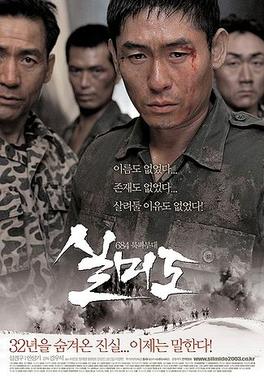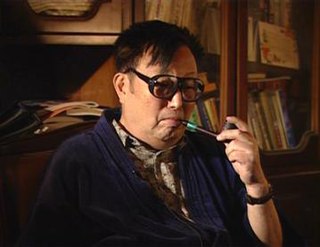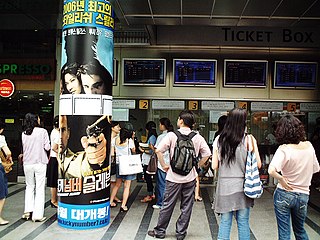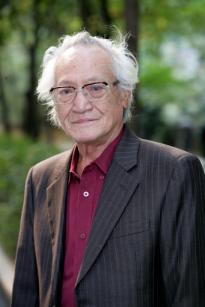Related Research Articles

Kim Ki-duk was a South Korean film director and screenwriter, noted for his idiosyncratic art-house cinematic works. His films have received many distinctions in the festival circuit, rendering him one of the most important contemporary Asian film directors.

Silmido (Korean: 실미도) is a 2003 South Korean action drama film directed by Kang Woo-suk. It is based on the 1999 novel Silmido by Baek Dong-ho, which in turn is based on the true story of Unit 684. Some parts of the film are dramatizations, as the actual details of certain events remain unknown. The film was both critically well received and a financial success, and was the first film in South Korea to attract a box office audience of over 10 million viewers.

Jung Ji-hoon, known professionally as Rain and Bi Rain, is a South Korean singer, songwriter, dancer, actor, and record producer. Rain's musical career includes seven albums, 28 singles and numerous concert tours around the world. He achieved breakthrough success with his third Korean album, It's Raining (2004), which spawned the number one single of the same name. The album sold over 200,000 copies in South Korea and one million copies throughout Asia, and established Rain as an international star.

Joint Security Area is a 2000 South Korean mystery thriller film directed and co-written by Park Chan-wook and based on the novel DMZ by Park Sang-yeon. It is Park Chan-wook's third film as director; as he largely disowned his first two films The Moon Is... the Sun's Dream (1992) and Trio (1997), Joint Security Area is frequently regarded as his first film with creative control, and Park himself prefers the film to be regarded as his directorial debut.

Pulgasari is an epic monster film Shin Sang-ok directed and produced in 1985 during his abduction in North Korea. A co-production between North Korea, Japan, and China, it is considered a remake of Bulgasari, a lost 1962 South Korean film that also depicts an eponymous creature from Korean folklore. The ensemble cast includes Chang Sŏnhŭi, Ham Kisŏp, Ri Chongguk, Ri Ingwŏn, and Yu Kyŏngae, with Kenpachiro Satsuma in the title role. Set during the Goryeo dynasty, the film follows a blacksmith's daughter who brings to life a metal-eating monster her late father envisioned to defeat the monarchy.

Kim Ki-young was a South Korean film director, known for his intensely psychosexual and melodramatic horror films, often focusing on the psychology of their female characters. Kim was born in Seoul during the colonial period, raised in Pyongyang, where he became interested in theater and cinema. In Korea after the end of World War II, he studied dentistry while becoming involved in the theater. During the Korean War, he made propaganda films for the United States Information Service. In 1955, he used discarded movie equipments to produce his first two films. With the success of these two films Kim formed his own production company and produced popular melodramas for the rest of the decade.

Hong Sang-soo is a South Korean film director and screenwriter. An acclaimed and prolific filmmaker, Hong is known for his slow-paced films about love affairs and everyday dilemmas in contemporary South Korea.

Memories of Murder is a 2003 South Korean neo-noir crime thriller film directed by Bong Joon-ho, from a screenplay by Bong and Shim Sung-bo, and based on the 1996 play Come to See Me by Kim Kwang-rim. It stars Song Kang-ho and Kim Sang-kyung. In the film, detectives Park Doo-man (Song) and Seo Tae-yoon (Kim) lead an investigation into a string of rapes and murders taking place in Hwaseong in the late 1980s.

Shin Sang-ok was a South Korean filmmaker with more than 100 producer and 70 director credits to his name. While renowned internationally for directing Pulgasari (1985), Shin is best known in South Korea for his efforts during the 1950s and 60s, many of them collaborations with his wife Choi Eun-hee, when he was known as "The Prince of South Korean Cinema". He posthumously received the Gold Crown Cultural Medal, the country's top honor for an artist.

South Korean films have been heavily influenced by such events and forces as the Korea under Japanese rule, the Korean War, government censorship, the business sector, globalization, and the democratization of South Korea.

Yu Hyun-mok was a South Korean film director. Born in Sariwon, Korea, Empire of Japan, he made his film debut in 1956 with Gyocharo (Crossroads). According to the website koreanfilm.org, his 1961 film Obaltan "has repeatedly been voted the best Korean film of all time in local critics' polls." Yu attended the San Francisco International Film Festival in 1963, where Variety called Obaltan a "remarkable film", and praised Yu's "[b]rilliantly detailed camera" and the film's "probing sympathy and rich characterizations."

Jung Woo-sung is a South Korean actor. Jung started his career as a fashion model, rising to stardom with the gangster film Beat (1997), for which he won Best New Actor at the 17th Korean Association of Film Critics Awards. He is a versatile actor known for playing leading roles in a wide spectrum of genres, including blockbusters The Good, the Bad, the Weird (2008), Cold Eyes (2013), The Divine Move (2014), The King (2017), Steel Rain (2017), Hunt (2022), 12.12: The Day (2023); dramas City of the Rising Sun (1999) and Mutt Boy (2003); historical epic Musa (2001); romance A Moment to Remember (2004); crime thrillers Asura: The City of Madness (2016) and Beasts Clawing at Straws (2020). He won Best Actor at the 55th Baeksang Arts Awards and the 40th Blue Dragon Film Awards for Innocent Witness (2019). His notable TV drama credits include Asphalt Man (1995), Padam Padam (2011) and Tell Me That You Love Me (2023–24).

Yoon Je-kyoon is a South Korean film director, screenwriter, and producer. His directorial debut My Boss, My Hero is about a gangster who is sent back to school, while Sex Is Zero has been compared with American Pie.

Choi Dong-hoon is a South Korean film director and screenwriter. He ranks as one of the most consistently successful directors working in contemporary Korean cinema, with all first five of his films becoming commercial hits -- The Big Swindle attracted 2.12 million viewers, Tazza: The High Rollers at 6.84 million, Jeon Woo-chi: The Taoist Wizard at 6.13 million, The Thieves at 12.9 million, and Assassination at 12.7 million.

Park Joong-hoon is a South Korean actor.

Kim-Jho Gwang-soo, also known as Peter Kim, is a South Korean film director, screenwriter, film producer and LGBT rights activist.

Kim Soo-hyun is a South Korean actor. One of the highest-paid actors in South Korea in 2020, his accolades include five Baeksang Arts Awards, two Grand Bell Awards and one Blue Dragon Film Award. He has been featured by Forbes in their Power Celebrity 40 and 30 Under 30 Asia lists. He was also selected as Gallup Korea's Television Actor of the Year.

Unbowed is a 2011 South Korean legal drama film starring Ahn Sung-ki and Park Won-sang. It was inspired by the true story of Kim Myung-ho, a math professor who was arrested for shooting a crossbow at the presiding judge of his appeal against wrongful dismissal.
Jonathan Sanger is an American film, television, and theater producer and director.

Lee Hae-jun is a South Korean film director and screenwriter. He wrote and directed Like a Virgin (2006), Castaway on the Moon (2009), and My Dictator (2014).